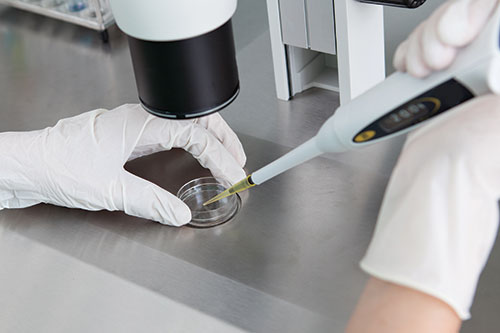Global Successes Advancing Stem Cell Technology
REGENERATIVE MEDICINE

Seeking to become a global leader in the field of stem cell technology, AMED is supporting the advancement of research and development towards the clinical application of regenerative medicine based on stem cell technology.
The project is focused on overcoming numerous barriers in order to translate the potential of the technology into practical drugs and treatments.
Key efforts include the development of induced pluripotent stem cell (iPSC) and embryonic stem cell stocks, and research into the safety and standardization of related processes. At the same time, the project is aiding the development of a comprehensive research framework in order to provide a platform for new discoveries in this field.
Support is also given to the exploration of treatment methods for dysfunctional tissues and organs, while other aspects of the project address the need for comprehensive evaluation techniques to clarify safety and efficacy of new discoveries ahead of commercialization.
Among the project’s most significant outcomes is the world’s first clinical application of iPSCs. The study used iPSC-derived retinal pigment epithelium cell transplantation to treat age-related macular degeneration in an elderly patient.
Moving forward, AMED aims to lead the development of a new generation of medicine based on stem cell technology in order to raise the quality of life of people around the world.
 Concept
Concept
Facilitate research and development for the clinical application of regenerative medicine based on stem cell technology. Support standardization of regulations, further discussion of ethics and promote commercialization of new products.
 Progress
Progress
In September 2014, the world’s first clinical study of iPSCs was conducted, using iPSC-derived retinal pigment epithelium cell transplantation to treat age-related macular degeneration. The iPSCs used were reprogrammed from the patient’s own cells.
A further five clinical studies are planned for 2017. However, rather than using patient-derived iPSCs, the trials will be conducted using iPSC stock provided by the Center for iPS Cell Research and Application, Kyoto University.
By utilizing stock cells in this way, it is possible to reduce the amount of time and funding required to produce the iPSCs.
AMED is working towards the practical application of iPSC-based regenerative medicine in the near future.
Last updated 09/20/18

